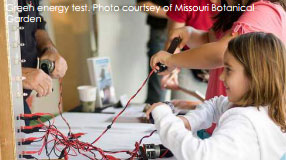Hold a Neighborhood Energy Challenge
Information and resources on holding a block or neighborhood-wide competition between individual households, groups of households, or different blocks to collectively reduce energy use.
Description

A neighborhood energy challenge is a block or neighborhood-wide competition between individual households, groups of households, or different blocks to collectively reduce energy use. A well-organized competition spreads knowledge, resources, and motivation to help communities save energy and money. The competition will track energy use over time, educate residents about energy conserving strategies, creatively help residents implement some of those strategies, publicly highlight the ongoing efforts, and reward the winning group with some sort of prize or recognition.
Related Tools
When paired with other tools, a neighborhood energy challenge can contribute to a greater and more holistic, sustainable neighborhood. Think about community engagement and empowerment, greening, streetscaping, and a public input campaign. Try combining a neighborhood energy challenge with:
Community Projects
Add your project
Neighborhood Benefits
Environmental
- Reduced energy use
- Conserved raw materials
- Reduced greenhouse gas emissions
Social
- Safer and more energy efficient homes
- Reduced risk of power outages at peak demand times
- Increased community solidarity through shared goals, collective action, and positive impacts on community and for individuals
Economic
- Reduced utility bills
- Green job opportunities
- Boost in local home repair industry
- Increased demand for energy saving products
Get Started
- Research Research other energy challenges including, Albany Neighborhood Energy Challenge, Power 2 Charlotte Neighborhood Energy Challenge, Central New York Energy Challenge, and even tips from the EPA. Gather ideas and tips for how to run a neighborhood energy challenge and decide which tactics are best for your community.
- Plan Considerations for creating your energy challenge are:
- How are participants organized? For this scale, organizing by block, street, school, or small group of households or businesses is best. Remember that homeowners, business owners, renters, schools, and even corporations can participate in the challenge.
- What kind of commitment do participants make? You can have residents sign a pledge.
- What is the energy reduction goal? Many neighborhoods try to reduce energy use by 10%.
- How will you track energy use? Participants will have to record energy use and bills over time. Find a creative way to make household changes/updates and energy records be visible or easily accessible, possibly with a public display board of ongoing progress.
- Is there a time frame for reaching your goal? A suggested time frame is 6 months.
- What incentives will you provide to encourage participation? In some communities, winners earn neighborhood improvements such as new sidewalks, street trees, street furniture, or rain gardens. Consider partnering other tools as a reward for the energy challenge.
- How will the challenge be funded and what will the funding go to? Grants may be available through Ameren, Laclede, Missouri Department of Natural Resources, or the US Department of Energy. You can create a resource guide for residents to improve their homes;host a series of helpful workshops of hands-on how-to training sessions for simple home repairs;weatherization;do home energy audits;help fund home energy audits;and, most importantly, create a public competition display or announcement forum that is easily visible in the community.
- Create Resources Local resources are helpful for residents participating in the challenge. Make this information available to challenge participants and possibly have representatives from these organizations host workshops for challenge participants.
- For home weatherization, see Urban League, Laclede Gas, Ameren, Rebuilding Together St. Louis, and the MO Department of Natural Resources.
- For home energy audits, you may be able to negotiate group rates, get tax reductions, get support, or train local resident volunteers on how to do home energy audits for the neighborhood. (Seattle)
- Work with local utility companies: Ameren, Laclede Gas.
Opportunities
- Publicize Create a publicly visible and accessible component to the challenge. Information, energy statistic updates, progress and other information is usually hard to understand because energy is often invisible, so work with creative local residents and possibly use an art installation to convey information.
- Track & Continue Track and document neighborhood progress, celebrate the end of the challenge, and reward the winners with prizes. Plan for continuing or expanding the energy challenge in the future.
Related Categories
Sustainability Plan Categories
Project Scale
- Block
- Neighborhood
- Public Building
- Street
Download This Tool
Hold a Neighborhood Energy Challenge Doc (392.20 KB pdf)
Need Help Viewing?
You need a program that can open Adobe PDF files. A free option:
- Adobe Reader can read PDF files